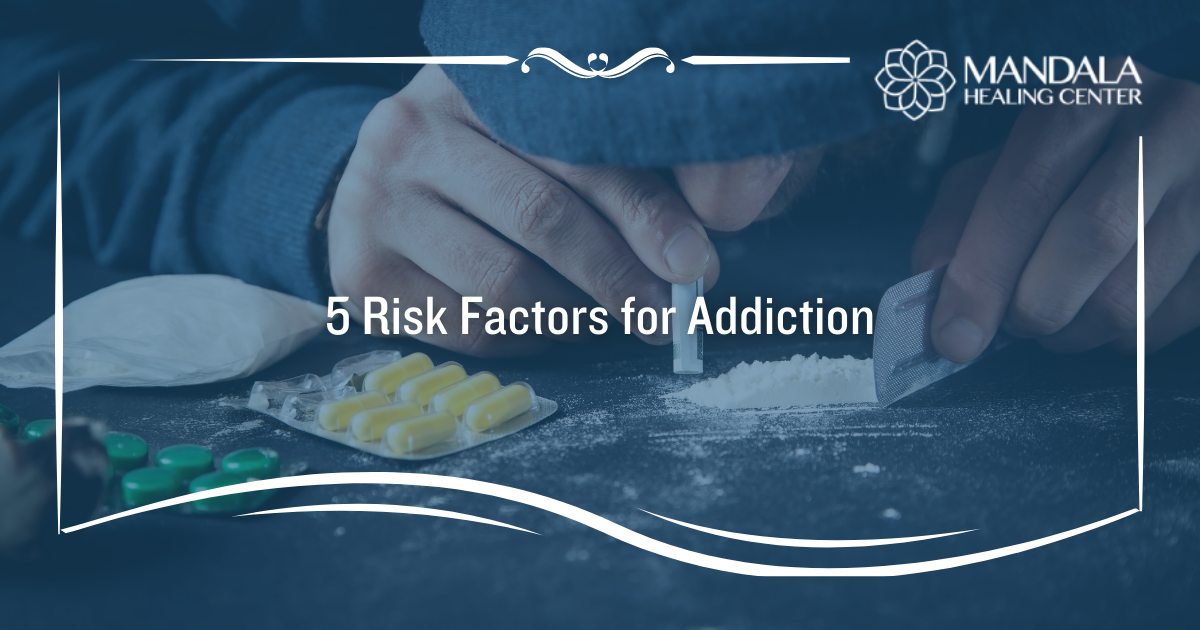Addiction to drugs and alcohol can keep people from living healthy, fulfilling lives. Addiction limits people’s opportunities, causes damage to their health, and strains their relationships. It’s safe to say that no one would choose to develop and live with addiction.
But why do some people become addicts and others don’t? Answering this question may help people avoid addiction or get the treatment they need. It’s essential to learn about the risk factors for addiction and recognize the signs of this destructive condition so that you can get the ongoing care and support you need.
If you or someone in your life need substance abuse or addiction treatment, reach out to the compassionate Mandala Healing Center specialists today to learn about starting one of our comprehensive, holistic programs.
5 Risk Factors for Addiction
Addiction is a complex condition. In many cases, it’s challenging to pinpoint the exact cause of a person’s drug or alcohol addiction. There are several known risk factors for addiction that can increase a person’s likelihood of developing substance abuse or addiction.
Here are five of the known risk factors for addiction.
1. Genetics
Addiction is not a moral failing, lack of willpower, or character flaw. Addiction is a disease that changes how a person’s body and brain function. When someone develops an addiction to drugs and alcohol, their body and brain depend on the substance to function normally, making it nearly impossible to stop using it without professional treatment.
Experts at the National Institute on Drug Abuse (NIDA) report that up to 50% of your risk factors for addiction can be linked to your genetics.[1] This means if you have an addicted family member–especially a biological parent–you’re at a higher risk of developing an addiction.
Addiction isn’t limited to drugs and alcohol. Having an addicted family member may increase your risk of developing any type of addiction, including gambling, sex, or food.
2. Environment
Where and how you live can impact your likelihood of developing an addiction to drugs and alcohol. Some of these environmental risk factors for addiction include:[2]
- Lack of parental involvement: Children who grow up with too little parental supervision or support may be more likely to begin using drugs and alcohol during adolescence. Research shows that the earlier a person starts using substances, the more likely they are to develop an addiction later in life.
- Peer pressure: People with peers who use drugs and alcohol may be more likely to try them at an earlier age because of peer pressure.
- Availability of drugs in the environment: A person who has many exposures to drugs and alcohol in their environment will likely have more opportunities to use them and may come to consider substance use to be “normal”.
- Experiencing neglect, abuse, or other trauma: People with a history of trauma are more likely to live with chronic stress or post-traumatic stress disorder (PTSD). When stress overwhelms a person’s ability to cope, they may turn to drugs or alcohol for temporary relief from their emotional discomfort. This is called self-medicating, and it is a significant risk factor for addiction.
Identifying your environmental triggers is a critical aspect of addiction recovery. Many people must avoid their triggers for years after completing or learn new coping skills to manage them.
3. Dual diagnosis
A person with a diagnosed substance use disorder and a mental illness has a dual diagnosis. Mental illness is one of the most significant risk factors for addiction.
Living with a mental illness like depression, anxiety, schizophrenia, or bipolar disorder, increases a person’s likelihood of using drugs and alcohol. Mental illness and substance abuse often exacerbate each other–the symptoms of mental illness may increase a person’s substance abuse, and substance abuse can increase symptoms of mental illness.
Drugs and alcohol may temporarily relieve anxiety, depression, and other symptoms of mental illness. But heavy or prolonged substance use can lead to a life-threatening addiction that can be very difficult to overcome. Nearly half of people with serious mental illness struggle with substance abuse and addiction.[3]
4. Drug of choice
When it comes to understanding the risk factors for addiction, one thing is clear: all drugs are not created equal. Research shows that some substances are simply more addictive than others. Several factors make a substance addictive. These include:
- How much the substance activates the brain’s dopamine–a neurotransmitter involved in reward and pleasure– system
- How pleasurable it is to use the drug (reported by people who use it)
- The potential for users to experience withdrawal when they stop using the substance
- The drug’s street value
- How much physical and cognitive damage the drug does
- How quickly users may develop dependence
A panel of addiction experts made a list of the most addictive substances. At the top of the list were:
- Heroin
- Alcohol
- Tobacco
- Barbituates
- Cocaine
Using drugs that have more addictive properties may increase a person’s likelihood of developing dependence or addiction.
5. Method of Use
Just like the type of substance you use matters, how you use it can affect your risk of addiction. Typically, swallowing a substance has a lower risk of addiction than other methods of ingestion. When you ingest a substance by mouth, your liver and other organs filter some of it out before it hits your bloodstream.
Injecting or smoking a substance allows the drug to bypass your liver and go straight into your bloodstream. The substance can reach your brain quickly, and the effects are often more intense than other delivery methods. How a person uses a substance may help answer why do some people become addicts and others don’t.
Find Treatment Now
Anyone can develop an addiction to drugs and alcohol, regardless of their risk factors for addiction. If you or someone you love needs addiction treatment, reach out to the Mandala Healing Center specialists today.
References:












